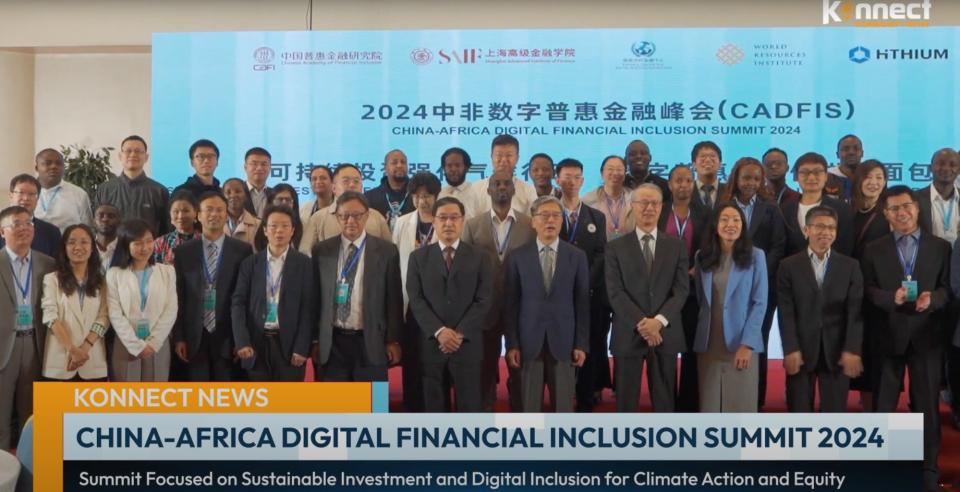China's green panda bonds are 'reliable' financing option for Africa, summit hears
African countries can easily raise financing by issuing "stable and reliable" green panda bonds, an executive of China's central bank has told a summit in Nairobi, as Beijing steps up its internationalisation of the Chinese currency.
"We welcome Africa to launch green bonds in China to raise stable and RMB-based financing from the Chinese market," said Ji Min, director general of the People's Bank of China counsellor's office.
Speaking at the 2024 China-Africa Digital Financial Inclusion Summit on Wednesday, Jin described the bonds as a "reliable and predictable source of funds" and noted that Egypt last year became the first African nation to issue green panda bonds.
Do you have questions about the biggest topics and trends from around the world? Get the answers with SCMP Knowledge, our new platform of curated content with explainers, FAQs, analyses and infographics brought to you by our award-winning team.
Facing an economic crisis and consequently fewer US dollars and other hard currencies, Egypt floated a three-year sustainability panda bond worth 3.5 billion yuan (US$478 million) in October.
Panda bonds - typically denominated in yuan and issued in China by non-Chinese organisations, including governments and corporations - have gained traction as traders and countries seek to diversify from an over-reliance on the US dollar.
More than 150 billion yuan worth of panda bonds were issued in China last year, with the number of issuers increasing by more than 80 per cent year on year, according to Chinese data.
Ji also told the summit that the yuan could play a bigger role in trade and cooperation between African countries and China, with opportunities for currency swaps and cross-border settlements.
For example, China and Kenya could use yuan and "Kenyan shillings to settle cross-border trade", Ji said.
Beijing has been encouraging the use of local currencies as part of its bid to de-dollarise the continent. The Bank of China said last year that its Zambian division would boost the yuan as a trading currency in Africa.
Also last year, South Africa's biggest lender, Standard Bank, and China's largest state-owned bank, Industrial and Commercial Bank of China, renewed a long-standing partnership that facilitates use of the Chinese currency across 15 African markets.

Delegates attend the 2024 China-Africa Digital Financial Inclusion Summit in Nairobi. Photo: YouTube alt=Delegates attend the 2024 China-Africa Digital Financial Inclusion Summit in Nairobi. Photo: YouTube>
Use of the yuan as a trading currency has also increased dramatically in other parts of the world. More countries - including Brazil, Argentina, Iraq and Pakistan - are accepting Chinese trade payments in yuan.
Saudi Arabia is said to be considering oil trade with China using the yuan. Use of the Chinese currency has also increased dramatically in Russia-China trade, because of Western sanctions on Moscow in the wake of its invasion of Ukraine.
The Nairobi summit heard that Beijing is ready to export its financial inclusion model - which saw the creation of fintech giants such as Tencent and Ant Group - to Africa, where it could serve as a guide.
Ji said Chinese authorities gave fintech companies the room to grow with a "tolerant, open and supportive" regulatory environment.
Africa could achieve similar success if countries accelerated digital financial inclusion through regulatory reforms that encouraged financing for small, medium and micro enterprises, as well as agribusiness, he said.
"We should go beyond large-scale projects," said Ji, referring to the need to fund more small businesses serving a broader population.
The summit also heard from Bei Duoguang, president of Renmin University's Chinese Academy of Financial Inclusion, who pointed out that China's digital financial inclusion had started with using mobile phones to make payments.
This progressed to digital lending and borrowing, and fintechs were now developing digital insurance, he said.
A total of 106 companies from Africa, China and other Asian countries signed up as inaugural members of the Afro-Asia Fintech Association, which was also unveiled at the event with the aim of increasing digital financial inclusion.
April Long, founder and chief executive of Pyxis Go, a cross-border mobile payment platform and a member of the association, said person-to-person money transfers were possible between Kenya and China, but the service was not provided to businesses.
Cross-border payment solutions would help individual traders to pay for products, since China remained the number one source of merchandise for African traders, she said.
Trade between China and Africa is massive, reaching US$282.1 billion in 2023, up 1.5 per cent year on year, according to China's customs data.
Grace Kyokunda, chief investment officer at the African Development Bank, said Africa had a lot to learn from China's digital financial inclusion. "We look forward to strengthening our partnership with China in developing digital financial solutions that cater to underserved populations," she said.
This article originally appeared in the South China Morning Post (SCMP), the most authoritative voice reporting on China and Asia for more than a century. For more SCMP stories, please explore the SCMP app or visit the SCMP's Facebook and Twitter pages. Copyright © 2024 South China Morning Post Publishers Ltd. All rights reserved.
Copyright (c) 2024. South China Morning Post Publishers Ltd. All rights reserved.

 Yahoo Finance
Yahoo Finance 